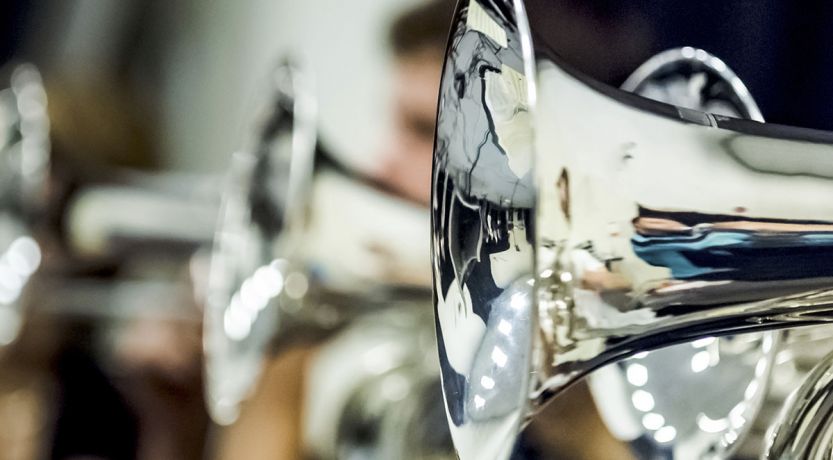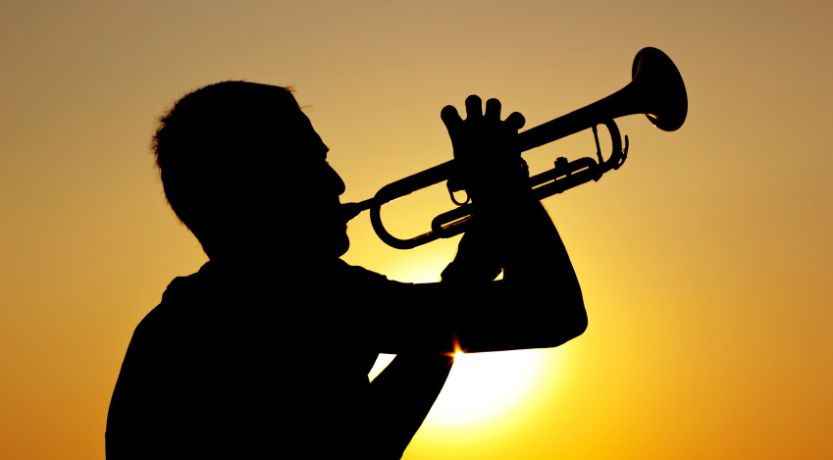For “Scripture Sunday”: Celebrating The Feast of Trumpets -
Rosh Hashanah which means "Head of the Year" or "First of the Year." This is because it falls on the first day of the seventh month of God's sacred calendar. The Feast of Trumpets is a very special feast day. In many ways, it is a pivotal day.
How the Seven Trumpets of Revelation Will Affect Humanity
“The book of Revelation speaks of seven successive trumpets that will sound prior to the return of Jesus Christ to earth. What do they represent?
The number seven is an often-repeated number throughout the last book of the Bible, the book of Revelation. This book, which was given to reveal what “must shortly take place” (Revelation 1:1), includes seven churches (verse 4), seven golden lampstands (verse 12), seven stars (verse 16), seven “lamps of fire … which are the seven Spirits of God” (4:5), seven seals (5:1), seven trumpets (8:6), a beast with seven heads and 10 horns (13:1), seven thunders (10:3) and seven last plagues (15:1), which are contained in seven golden bowls (15:6-7).
 The seven seals, seven trumpets and seven last plagues form an outline of prophetic events that will occur before and at the time of Christ’s return to earth. As our articles “Seven Seals,” “Four Horsemen of the Apocalypse” and “Wrath of God” explain, the first five of the seven seals represent Satan’s wrath against God’s people and mankind in general. The sixth seal announces the wrath of God (Revelation 6:12-16).
The seven seals, seven trumpets and seven last plagues form an outline of prophetic events that will occur before and at the time of Christ’s return to earth. As our articles “Seven Seals,” “Four Horsemen of the Apocalypse” and “Wrath of God” explain, the first five of the seven seals represent Satan’s wrath against God’s people and mankind in general. The sixth seal announces the wrath of God (Revelation 6:12-16).
The seventh seal represents the Day of the Lord—the major theme of the book of Revelation. This seventh seal includes God’s judgment upon disobedient mankind in the form of seven trumpet plagues (Revelation 8-9) and seven last plagues (Revelation 15-16).
(Our bimonthly Discern magazine covers issues like this regularly. We’d be happy to give you a free subscription to Discern. Digital subscriptions are available worldwide; print subscriptions are currently available in the United States, Canada and much of Europe.)
Seven trumpets and their meaning
When the seventh seal was opened, John saw seven angels with seven trumpets. As each angel blew his trumpet, John saw terrifying plagues unfold, and he used powerful symbolic language to try to describe what he was witnessing.
First Trumpet: Hail and fire mingled with blood will cause all the grass on earth and a third of the trees to be burned up (Revelation 8:7).
Second Trumpet: A great mountainous burning object will be thrown into the earth’s oceans, causing one third of them to become blood, one third of sea life to die and one third of the ships to be destroyed (verses 8-9).
Third Trumpet: John saw a burning star fall from heaven on sources of fresh water, causing the water to become bitter and kill many (verses 10-11).
Fourth Trumpet: The light of the sun, moon and stars upon the earth will be diminished by a third (verse 12).
Fifth Trumpet (also called the first woe): What John could only describe as an unusual type of locust (likely seeing in the vision modern military aircraft) will emerge on the earth that will inflict intensely painful stings upon humans for five months (Revelation 9:1-12).
Sixth Trumpet (also called the second woe): Four angels will be released to kill one-third of the earth’s remaining population via an army of 200 million (verses 13-19).
Seventh Trumpet (also called the third woe): As this trumpet is sounding, voices in heaven will say, “The kingdoms of this world have become the kingdoms of our Lord and of His Christ, and He shall reign forever and ever!” (Revelation 11:15).
Impact of the trumpets
Because of mankind’s disobedience to His holy and beneficial laws, God will bring this severe punishment upon earth’s inhabitants. The effects of the first six trumpets will include an ecological disaster of epic proportion. And as the planet struggles to support life, humans will have to endure such intense pain that they will desire to die (Revelation 9:6); and many will indeed die, as noted in the description of the sixth trumpet (verses 13-19).
While one would think that such intense punishment would cause people to repent of their sins, this will not occur. As the Bible explains, “But the rest of mankind, who were not killed by these plagues, did not repent of the works of their hands, that they should not worship demons, and idols of gold, silver, brass, stone, and wood, which can neither see nor hear nor walk. And they did not repent of their murders or their sorceries or their sexual immorality or their thefts” (Revelation 9:20-21).
Humans are going to be so set on their freedom to break God’s laws that they will be willing to die for their way of life rather than repent. What a truly sad state of deception Satan has perpetrated upon mankind (Revelation 12:9)!
Because people will not repent, seven additional punishments called “the seven last plagues” (Revelation 15:1) will come upon mankind. While these sobering judgments are destined to come upon the inhabitants on earth, our loving God does not desire any to ultimately perish (2 Peter 3:9) and will in due time give every human an opportunity to understand His way of life and choose whether to obey God or not. This opportunity will come during and after a 1,000-year period of time called the Millennium—a time when Satan will be bound and unable to deceive mankind.”
From: https://lifehopeandtruth.com/prophecy/revelation/seven-trumpets/
________
S eventh Seal Reveals Seven Trumpet Plagues
eventh Seal Reveals Seven Trumpet Plagues
Revelation 8:1-2
“When He opened the seventh seal, there was silence in heaven for about half an hour. And I saw the seven angels who stand before God, and to them were given seven trumpets.
The book of Revelation describes seven seals on a prophetic scroll. When we come to Revelation 8:1-2, the first four seals (also known as the Four Horsemen of the Apocalypse), the fifth seal and the sixth seal have all been opened. Now Jesus Christ opens the seventh and last seal to reveal seven angels and their trumpets. In succession, these seven angels blow their trumpets to announce seven terrible end-time events.
- First trumpet: Trees and grass struck (Revelation 8:7).
- Second trumpet: Seas struck (8:8-9).
- Third trumpet: Fresh waters struck (8:10-11).
- Fourth trumpet: Sun, moon and stars struck (8:12).
- Fifth trumpet (first woe): Symbolic locusts torment people for five months (9:1-11).
- Sixth trumpet (second woe): A 200-million-man army kills one-third of humanity (9:13-21).
- Seventh trumpet (third woe): Announces the return of Jesus Christ and the seven last plagues (11:15-19; 16:1-21).
Read more in our article “How the Seven Trumpets of Revelation Will Affect Humanity.” These trumpets are tied into the meaning of the fourth of God’s festivals, the Feast of Trumpets.”
From: https://lifehopeandtruth.com/bible/blog/seventh-seal-reveals-seven-trumpet-plagues/
________
Update.
As I haven’t found anyone to hire to help with the remaining little bit of carpentry, plumbing and electrical work in the mini-house, progress there is at a standstill.
One day the folks who originally had the baby kittens came to help me clean up the grooming room. I couldn’t get those big cages down by myself to clean and vacuum under them, they felt that it was the least that they could do to help. I was very grateful. The kittens are now in the Habitiat at Petco on display for adoption.
The cat that I am taking care of for the folks whose house was damaged in the flood was not taught to stay off tables and counter tops. I think that should be the first thing in a cat’s etiquette learning. She is sweet and loving to me, but chases my other foster cat and terrorizes her. Hopefully she will go home soon.
My young neighbor, Zach, had lost his job so I hired him to help me one moning, but it was to get Roy’s stuff out of my storage area. I can’t reach high up, so that is why I needed help to get it and tote it into my green house, which is not being used for plants right now. All that stuff is now deemed abandoned, as not a word from Roy, so most of it will be donated.
One day I took Zach for his doctor appointment like I usually do, and then the next day I took him to the food bank and Kroger’s. Just ordinary life going on except that this week there were two Sabbaths.
Our church was celebrating The Feast of Trumpets on Friday, so on Thursday I was cooking enough for both Friday and Saturday Sabbaths. I read somewhere that Apples and honey were good fare for this feast, so I made Apple Crumble Slices. A mixture of different things including oats, apple sauce, cinnamon and honey are placed on apple slices and put in the oven, and it turned out pretty good.
Because I have a lot of chicken in my freezer, I made organic minced chicken and organic veggies again, and also made some chicken sausage wontons. So that they wouldn’t fall apart I cooked them in water just before church service started and put them in a crockpot with some Matzo Balls in chicken broth, but they fell apart anyway. Next time I will use a crispy wonton recipe where they can be kept warm in the oven. We also had organic beef meatloaf, Chicken à la King, slaw, salad, pie, cookies and a big cake with “Trumpets” written on it.
For the Friday celebration, after Jeff had blown several of the special blasts of the shofar, we sang songs relating to the trumpets and then the Bible readings which were Gen. 22:1-24, Num. 29:1-6 (about the feast) and Jer. 31:2-20 and the Teaching was about Repentance, the main theme of the Feast of Trumpets. We all had a great time in the dining hall afterwards, even though some had to leave early as it was a weekday.
On Saturday, our regular Sabbath, the readings were Deut. 11:26-17, Isa. 54:11-55:5, and Jer. 7:37-52. The teaching was more about Repentance with the stories from the Bible about the wicked king Jehoram and his nasty end (2 Chron. 21). Then the king Manasseh who started out really evil in his ways, and how he repented, humbled himself, did away with the false idols and was blessed in the end. (2 Chron. 33).
There was plenty of food left over from the day before, so we all had our fill, plus ‘doggie bags’, and really enjoyed the fellowship.
Then today, Sunday, I went to the Bible study and service at the little church next to our subdivision with Hans, a neighbor, and afterwards several of us went to eat lunch at a local Mexican restaurant, so I really had an enjoyable Christian three days.

 God instructed ancient Israel in the appropriate use of trumpets—a hollow animal horn, known as a shofar, and metal instruments—to communicate important messages.
God instructed ancient Israel in the appropriate use of trumpets—a hollow animal horn, known as a shofar, and metal instruments—to communicate important messages.





 This is what it looked like coming from the other way. and everyone around here knew not to try to go through it. In 1994 a lady tried it in a pick-up truck, and they found her body in someone’s swimming pool after the waters had receded.
This is what it looked like coming from the other way. and everyone around here knew not to try to go through it. In 1994 a lady tried it in a pick-up truck, and they found her body in someone’s swimming pool after the waters had receded. 












